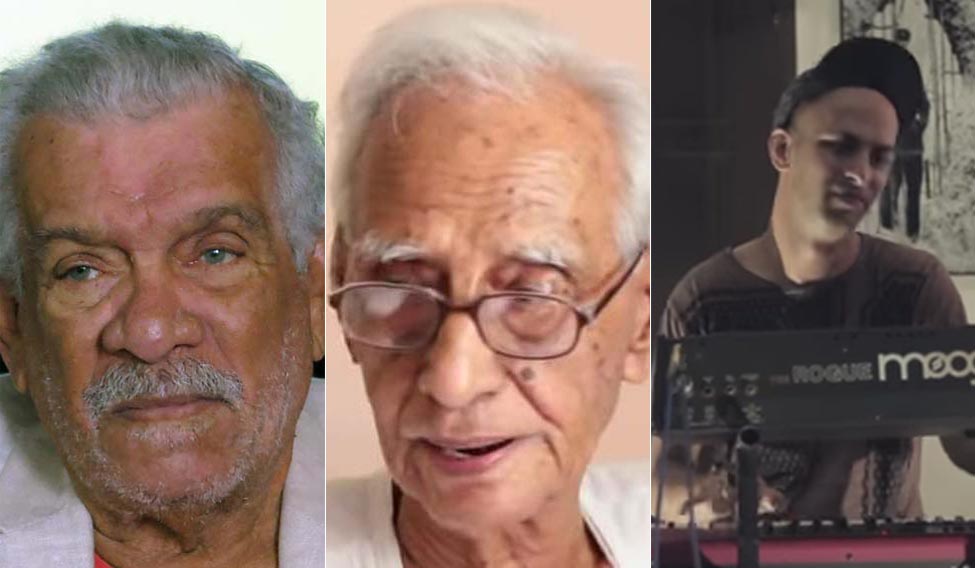Derek Walcott (died March 17, 2017)
Felicity is a village in Trinidad on the edge of the Caroni plain, the wide central plain that still grows sugar and to which indentured cane cutters were brought after emancipation, so the small population of Felicity is East Indian, and on the afternoon that I visited it with friends from America, all the faces along its road were Indian, which, as I hope to show, was a moving, beautiful thing, because this Saturday afternoon Ramleela, the epic dramatization of the Hindu epic the Ramayana, was going to be performed, and the costumed actors from the village were assembling on a field strung with different-coloured flags, like a new gas station, and beautiful Indian boys in red and black were aiming arrows haphazardly into the afternoon light. Low blue mountains on the horizon, bright grass, clouds that would gather colour before the light went. Felicity! What a gentle Anglo-Saxon name for an epical memory.
The above extract is from the Nobel acceptance speech of Trinidad poet Derek Walcott. As he poignantly describes the performance of Ramleela in the Carribean, his works are all a subtle commentary on the lives of the indentured labourers who were brought in from across the world. Walcott came to the attention of the public in 1962 with a collection of poems called, In a Green Night, which celebrated the Caribbean.
In Omeros (1990), an epic poem considered his most ambitious and accomplished work, he invoked Caribbean voices through Greek myth, drawing on Homer's Iliad and Odyssey. Two years later, he was awarded the Nobel Prize, and in its citation, the Swedish Academy said: "He has both African and European blood in his veins. In him, West Indian culture has found its great poet."
Ironically, he was most known for his long-standing with another Nobel laureate, V.S. Naipaul, who was of Indian origin and native of Trinidad. This led to several back and forth statements between the two, with Walcott calling Naipaul 'Nightfall' and taking potshots at him with a poem Mongoose, while the latter called Walcott's writing stale.
Deities were entering the field. What we generally call “Indian music” was blaring from the open platformed shed from which the epic would be narrated. Costumed actors were arriving. Princes and gods, I supposed. What an unfortunate confession! “Gods, I suppose” is the shrug that embodies our African and Asian diasporas. I had often thought of but never seen Ramleela, and had never seen this theatre, an open field, with village children as warriors, princes, and gods. I had no idea what the epic story was, who its hero was, what enemies he fought, yet I had recently adapted the Odyssey for a theatre in England, presuming that the audience knew the trials of Odysseus, hero of another Asia Minor epic, while nobody in Trinidad knew any more than I did about Rama, Kali, Shiva, Vishnu, apart from the Indians, a phrase I use pervertedly because that is the kind of remark you can still hear in Trinidad: “apart from the Indians”.
Ashokamitran (March 23)
Legendary Tamil writer Ashokamitran passed away at the age of 85 in Chennai. Among some of his best known works of the criminally underrated writer are Fourteen Years with Boss, a narration of his life at the legendary Gemini studios, with his boss S.S. Vassan. Another one of his brilliant works is the short story The Ghosts of Meenambakkam, where the narrator, who is at the airport, face to face with the ghost of his daughter, comes into contact with Dalpathado, another ghost of his past. Before the night ends, their lives change forever. Most of his works were translated by N. Kalyana Raman.
Born in 1931, he has more than 220 short stories, apart from novels and novellas to his name.
In 1996, he won the Sahitya Akademi Award for his collection of short stories Appavin Snegidhar.
Karan Joseph (September 9)
One of the most tragic incidents to mar 2017 was the death of Karan 'madfingers' Joseph, 29, an incident which pointed to the presence of organised mafia in all sectors of entertainment, including music. A highly acclaimed Indie keyboard player, Karan had committed suicide by jumping from the 12th floor of Bandra Bandstand's Concorde apartments. Just before the gory incident in the highrise, he had returned home from a party. Reports claimed that he had called his mother the previous day complaining of financial problems and threats from people around him.
Amidst wild theories that the musician was suffering from depression, investigation was transferred to the police crime branch. Joseph's father is a doctor and his parents live in Bangalore. After his death, family members had alleged foul play in the case stating that the investigation in this case was being compromised.
His father had also demanded that a murder case be filed in this connection.







